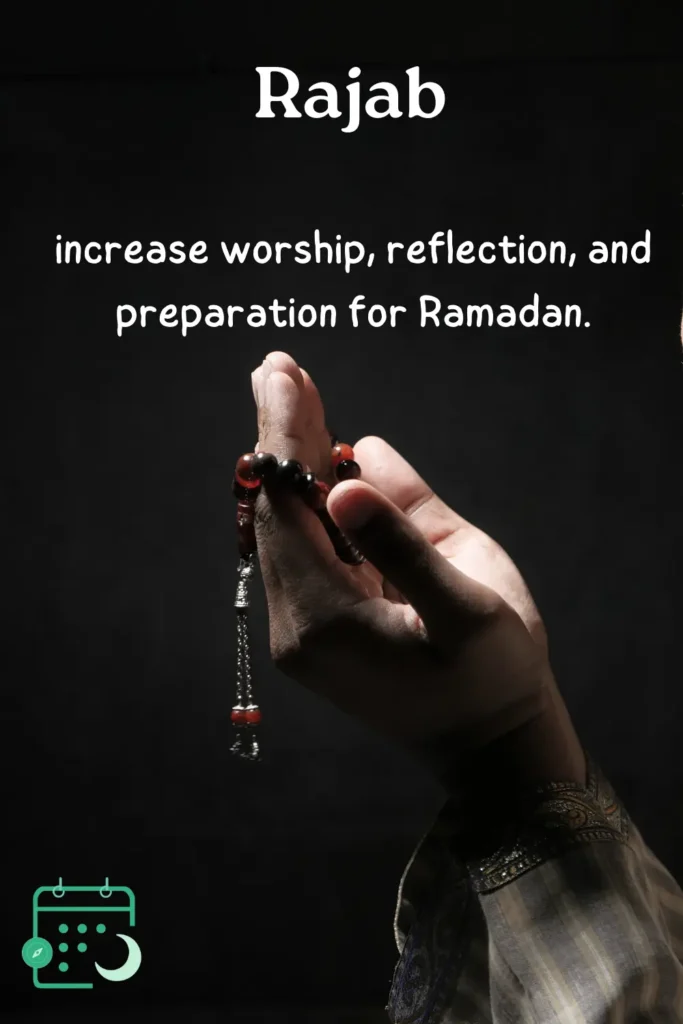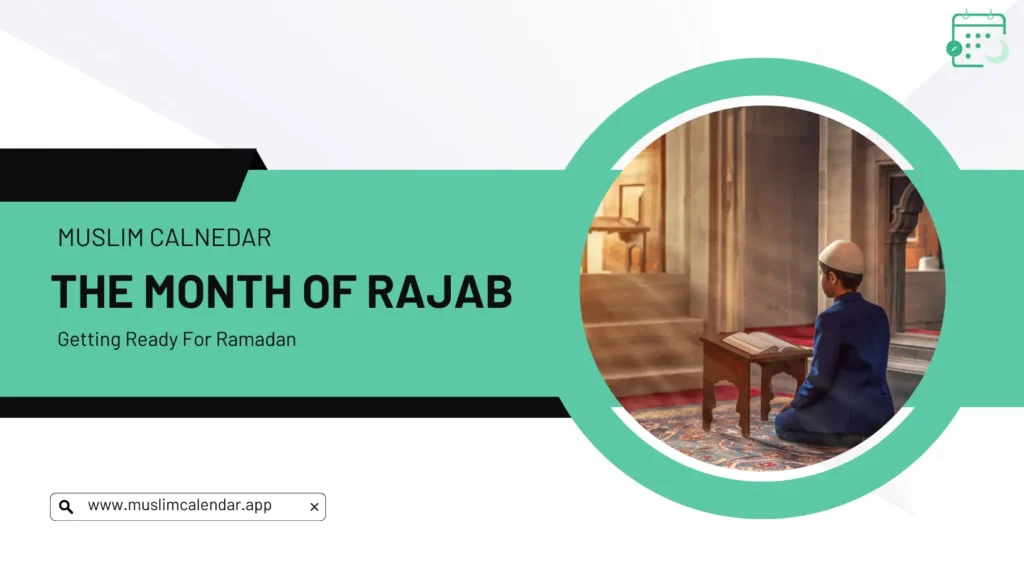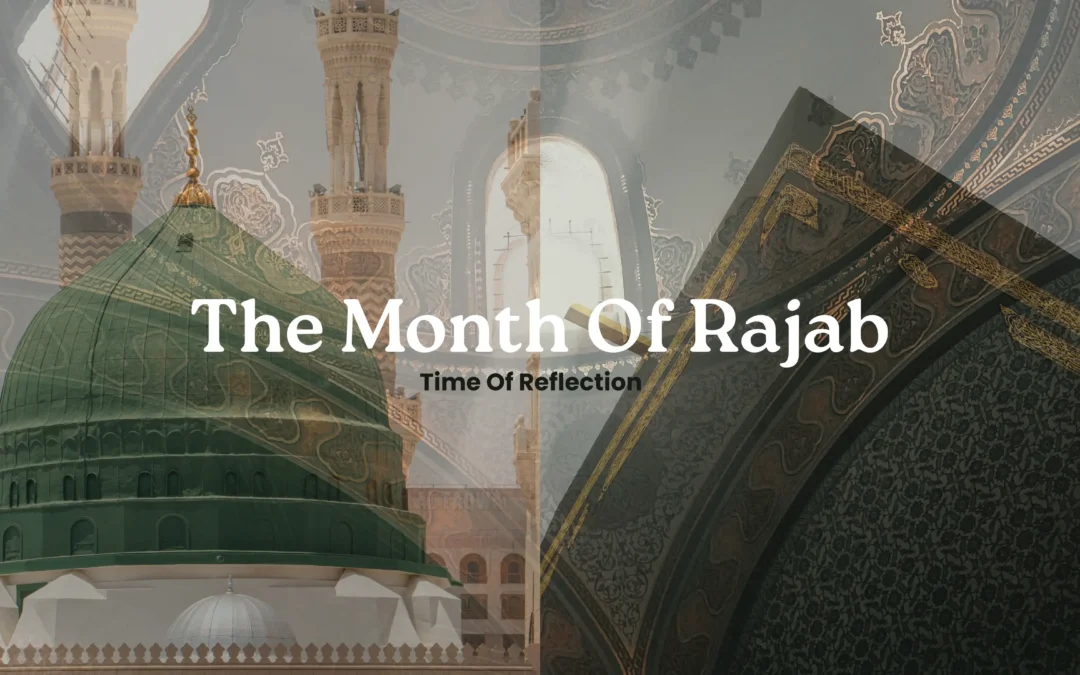Introduction
“Indeed, the number of months with Allah is twelve [lunar] months in the register of Allah [from] the day He created the heavens and the earth; of these, four are sacred.” (Quran 9:36)
Among the four sacred months mentioned in the Holy Quran, Rajab sacred month holds a unique position as the gateway to spiritual transformation. As the seventh month of the Islamic lunar calendar, Rajab serves as a divine opportunity for Muslims worldwide to engage in Rajab spiritual renewal and begin their journey of preparing for Ramadan in the month of Rajab. Known as the “Rajab month of Allah,” this blessed month calls upon believers to strengthen their connection with the Almighty through increased worship, repentance, and spiritual reflection. Understanding the Rajab spiritual significance is essential for every Muslim seeking to maximize the blessings of this sacred time.
1. What is Rajab?
The Meaning and Origin of Rajab
The word “Rajab” derives from the Arabic root “rajaba,” meaning “to respect” or “to honor.” This linguistic origin reflects the month’s elevated status in Islamic tradition, demanding reverence and spiritual consciousness from believers. As the seventh month in the Islamic lunar calendar, Rajab stands as one of the four sacred months (Al-Ashhur al-Hurum) alongside Dhul-Qa’dah, Dhul-Hijjah, and Muharram.
Rajab of Mudar: Historical Context
Rajab is often referred to as “Rajab of Mudar” (Rajab Mudar), named after the Mudar tribe who particularly honored this month during the pre-Islamic era. Unlike other Arabian tribes who sometimes altered the timing of sacred months for their convenience, the Mudar tribe consistently respected Rajab’s sanctity. The Prophet Muhammad ﷺ validated this practice, saying: “The year is twelve months, of which four are sacred: three consecutive months, Dhul-Qa’dah, Dhul-Hijjah, and Muharram, and Rajab of Mudar which comes between Jumada and Sha’ban.” (Bukhari)
This historical designation emphasizes the continuity between pre-Islamic Arabian respect for sacred months and Islamic teachings, showing how Islam refined and perfected existing noble practices.
2. The Spiritual Significance of the month of Rajab: Month of Allah
Rajab as a Sacred Month
The Rajab spiritual significance extends far beyond its chronological position in the Islamic calendar. As one of the sacred months, Rajab carries the divine prohibition against warfare and conflict, as mentioned in the Quran: “They ask you about the sacred month – about fighting therein. Say, ‘Fighting therein is great [sin]'” (Quran 2:217). This prohibition creates an atmosphere of peace and tranquility, allowing believers to focus entirely on spiritual growth and worship.
The Month of Allah
Islamic scholars refer to Rajab as “Shahr Allah” (the Month of Allah), highlighting its special divine connection. According to authentic Islamic traditions, the Prophet ﷺ said: “Rajab is the month of Allah, Sha’ban is my month, and Ramadan is the month of my Ummah.” This designation elevates Rajab’s status, making it a time when Allah’s mercy and blessings are abundantly available to sincere seekers.
Increased Spiritual Accountability
During Rajab, the severity of sins is magnified, just as good deeds carry greater rewards. Islamic scholars explain that sinning during sacred months is more serious than sinning during regular months, as it violates both the sanctity of time and divine commandments. This increased accountability serves as a powerful motivator for Rajab repentance and prayer, encouraging believers to seek forgiveness and purify their souls.
The month provides an excellent opportunity for Rajab spiritual renewal, allowing Muslims to assess their spiritual state, seek forgiveness for past mistakes, and establish stronger foundations for their relationship with Allah before entering the blessed month of Ramadan.
3. Essential Worship Practices in the month of Rajab
Rajab Fasting: Guidelines and Benefits
Rajab fasting and charity form the cornerstone of recommended worship during this sacred month. While there are no obligatory fasts specific to Rajab, voluntary fasting (sawm tatawwu) carries immense spiritual benefits. The Prophet ﷺ encouraged fasting during the sacred months, saying: “Fast some days of the sacred months and leave some days.” (Abu Dawud)
Islamic scholars recommend moderate fasting during Rajab, particularly on Mondays and Thursdays, following the Prophetic tradition. The spiritual benefits of Rajab fasting include:
- Increased spiritual discipline and self-control
- Enhanced consciousness of Allah (Taqwa)
- Preparation for Ramadan’s intensive fasting schedule
- Purification of the soul from worldly distractions
The Power of Charity in the month of Rajab
Charity (Sadaqah) during Rajab holds special significance in Islamic spirituality. The sacred nature of the month multiplies the rewards for charitable acts, making it an ideal time for increased giving. Whether through monetary donations, feeding the poor, or helping those in need, charity during Rajab serves multiple purposes:
- Spiritual purification and soul cleansing
- Community strengthening and social solidarity
- Preparation for Ramadan’s emphasis on generosity
- Drawing closer to Allah through selfless giving
Enhanced Prayer and Dhikr
The month of Rajab provides an excellent opportunity to increase voluntary prayers (Salah Nafl) and remembrance of Allah (Dhikr). Scholars recommend:
- Performing additional Sunnah prayers after obligatory Salah
- Engaging in night prayers (Tahajjud) when possible
- Increasing recitation of the Quran with contemplation
- Regular dhikr sessions, particularly seeking forgiveness (Istighfar)
Studying Prophetic Biography
Rajab offers an ideal time for studying the Seerah (biography) of Prophet Muhammad ﷺ, particularly focusing on events that occurred during this sacred month. This practice enhances spiritual connection, provides practical guidance for daily life, and deepens understanding of Islamic principles.

4. Preparing for Ramadan: Why the month of Rajab Matters
Rajab as the Spiritual Gateway to Ramadan
Understanding preparing for Ramadan in Rajab is crucial for maximizing the benefits of the holy month. Rajab serves as the spiritual gateway to Ramadan, providing believers with a two-month preparation period (Rajab and Sha’ban) to gradually intensify their worship and spiritual practices. This preparation ensures that Muslims enter Ramadan with purified hearts, established spiritual routines, and clear religious focus.
The Prophet ﷺ used to seek Allah’s blessings for Rajab and Sha’ban in preparation for Ramadan, saying: “O Allah, bless us in Rajab and Sha’ban and enable us to reach Ramadan.” (Ahmad) This prophetic supplication emphasizes the interconnected nature of these three months in the Islamic spiritual calendar.
Physical and Mental Preparation
Ramadan preparation tips beginning in Rajab include:
Physical Preparation:
- Gradual adjustment to fasting schedules through voluntary fasts
- Adopting healthier eating habits and meal timings
- Reducing excessive consumption and practicing moderation
- Establishing regular sleep patterns conducive to early morning prayers
Mental and Spiritual Preparation:
- Setting clear spiritual goals for Ramadan
- Identifying and addressing spiritual weaknesses
- Establishing consistent prayer and Quran reading routines
- Creating a supportive environment for intensive worship
Building Spiritual Momentum
Rajab provides the perfect opportunity to build spiritual momentum that will carry through Sha’ban into Ramadan. By gradually increasing worship activities, seeking forgiveness, and strengthening religious practices, believers create a foundation for sustained spiritual growth throughout the blessed months ahead.
5. Historical Milestones: Sacred Events in the month of Rajab
Isra and Mi’raj: The Divine Night Journey
The most significant event associated with Rajab is Isra and Mi’raj Rajab – the miraculous night journey and ascension of Prophet Muhammad ﷺ. According to Islamic tradition, this extraordinary spiritual experience occurred on the 27th night of Rajab, when the Prophet was transported from Masjid al-Haram in Mecca to Masjid al-Aqsa in Jerusalem, and then ascended through the heavens to meet Allah.
The Isra and Mi’raj event holds profound significance for several reasons:
- It demonstrates the Prophet’s special status and divine connection
- The five daily prayers were prescribed during this journey
- It provides insights into the spiritual realms and afterlife
- It serves as a source of comfort and inspiration for believers facing difficulties
While some scholars debate the exact date, the spiritual lessons from Isra and Mi’raj remain universally accepted and continue to inspire Muslim spiritual aspirations.
The Conquest of Tabuk
Another significant historical event, the Conquest of Tabuk in the month of Rajab, occurred in the 9th year of Hijra (630 CE). This expedition, led by Prophet Muhammad ﷺ, demonstrated the importance of defensive preparedness and unity among believers. The Tabuk expedition is notable for:
- Showing the companions’ dedication and sacrifice for Islam
- Demonstrating the importance of community support during challenges
- Revealing the characteristics of true believers versus hypocrites
- Highlighting the significance of trust in Allah during difficulties
Other Notable Events
Several other important events in Islamic history occurred during Rajab, including various conquests and significant religious developments that shaped the Muslim Ummah’s growth and expansion.
6. Avoiding Innovations: Authentic Rajab Practices
Common Misconceptions About the month of Rajab
Understanding authentic Islamic practices is crucial for avoid innovations in Rajab. Several misconceptions and fabricated traditions have developed around Rajab observances that lack authentic Islamic foundation:
Misconceptions to Avoid:
- Belief that fasting specifically on the 27th of Rajab is especially rewarded
- Special prayers or rituals claimed to be specific to Rajab
- Excessive celebration of Isra and Mi’raj without authentic basis
- Attributing specific rewards to actions without sound Hadith evidence
Staying Within Authentic Boundaries
Islamic scholarship emphasizes the importance of following authentic Prophetic guidance rather than innovations (Bid’ah). The Prophet ﷺ warned: “Every innovation is a going astray, and every going astray is in the Fire.” (Muslim)
Authentic Practices Include:
- General voluntary worship as recommended throughout the year
- Moderate fasting based on established Sunnah patterns
- Increased charity and good deeds
- Regular prayer, Quran recitation, and dhikr
- Seeking forgiveness and making sincere repentance
Scholarly Guidance
Following the guidance of authentic Islamic scholarship helps believers distinguish between legitimate religious practices and fabricated traditions. Consulting reliable Islamic sources and scholars ensures that Rajab observances remain within the boundaries of authentic Islamic teaching.
7. Your Rajab Action Plan: Do’s and Don’ts
Do’s: Recommended Actions in Rajab
Spiritual Practices:
- Engage in voluntary fasting on Mondays, Thursdays, and other recommended days
- Increase charity (Sadaqah) and help those in need
- Perform additional voluntary prayers (Nafl Salah)
- Make sincere repentance (Tawbah) for past sins
- Increase dhikr and remembrance of Allah
- Study Islamic history and Prophetic biography
- Make du’a for blessings in the coming months
Preparation Activities:
- Set spiritual goals for Ramadan
- Establish consistent worship routines
- Reduce engagement in worldly distractions
- Strengthen family and community relationships
- Plan for increased religious activities
Don’ts: Actions to Avoid in the month of Rajab
Prohibited Actions:
- Engaging in warfare or conflicts (except in self-defense)
- Committing sins, which carry increased severity during sacred months
- Following fabricated traditions not supported by authentic Islamic sources
- Neglecting regular obligatory worship in favor of unproven practices
- Excessive celebration without authentic religious basis
General Cautions:
- Avoid innovations (Bid’ah) in religious practices
- Don’t neglect family and social responsibilities
- Avoid extremism in worship that may lead to burnout
- Don’t postpone repentance or spiritual improvement
Conclusion
The Rajab sacred month stands as a divine gift, offering believers a precious opportunity for Rajab spiritual renewal and comprehensive preparation for the holy month of Ramadan. Through understanding its Rajab spiritual significance and implementing authentic worship practices, Muslims can transform this blessed time into a catalyst for lasting spiritual growth.
As we embrace the Rajab month of Allah, let us commit to sincere repentance, increased worship, and genuine preparation for the spiritual journey ahead. The practices of Rajab fasting and charity, combined with Rajab repentance and prayer, create a foundation for meaningful spiritual development that will benefit us not only during Ramadan but throughout the entire year.
May Allah bless us in Rajab, grant us the opportunity to witness Ramadan, and accept our sincere efforts during these sacred months. Through authentic practice, sincere intention, and consistent effort, we can make Rajab a transformative experience that draws us closer to Allah and prepares us for the spiritual heights of Ramadan.
“O Allah, bless us in Rajab and Sha’ban and enable us to reach Ramadan.” (Ahmad)

Frequently Asked Questions (FAQs)
Is Rajab a sacred month in Muslim Calendar? Yes, Rajab is one of the four sacred months mentioned in the Quran (9:36), along with Dhul-Qa’dah, Dhul-Hijjah, and Muharram.
Should I fast on the 27th of Rajab? There is no specific authentic recommendation for fasting on the 27th of Rajab. General voluntary fasting is recommended throughout the month based on established Sunnah patterns.
What are the special rewards in the month of Rajab? Good deeds during sacred months, including Rajab, carry increased rewards. However, specific claims about unique rewards should be based on authentic Islamic sources.
Should I perform Umrah in the month of Rajab? While Umrah can be performed any time of the year, there is no specific additional reward for performing it in Rajab according to authentic Islamic sources.
How to prepare for Ramadan starting in Rajab? Begin with moderate voluntary fasting, increase charity and prayers, seek forgiveness, study Islamic teachings, and gradually build spiritual momentum for Ramadan.
Ready to turn on spiritual glow-up? Make Rajab count—hit extra worship, dua, good deeds, and let muslimcalendar.app guide you every step of the way.
Knowledge Base:
- Yaqeen : https://yaqeeninstitute.org/
- Muslim World League – https://themwl.org/

